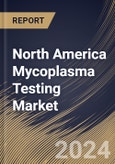Mycoplasma testing refers to detecting and identifying mycoplasma bacteria in biological samples, such as cell cultures and clinical samples. Mycoplasma is a group of small bacteria that lack a cell wall and survive in various environments, including laboratory cell cultures. They can contaminate cell cultures, leading to changes in the behaviour and characteristics of the cells and affecting the experimental research results. Therefore, this testing is important in cell culture research and manufacturing biological products to ensure the purity of the cultures and prevent contamination.
Mycoplasma contamination in the complex processes of biopharmaceutical production can result in substantial financial losses, production delays, and compromised product quality. The imperative drives the adoption of this testing in this sector to identify and mitigate the risk of contamination early in the production chain. Robust testing protocols are integral to ensuring the integrity of biopharmaceutical products and safeguarding investments in research and development.
Biomanufacturing facilities in Mexico, producing vaccines, monoclonal antibodies, and other biopharmaceuticals, implement this testing as a critical quality control measure. The development and manufacturing of cell-based therapies in Mexico, including regenerative medicine and personalized cell therapies, drive the need for this testing. Facilities involved in cell line banking in Mexico, where cells are stored and distributed for research and production purposes, implement this testing to maintain the quality of stored cell lines. This testing plays a role in preventive healthcare measures in Mexico, particularly in diagnostic laboratories where cell cultures are used for various diagnostic purposes. Advances in cell and gene therapies in Mexico contribute to the growing importance of this testing. Therefore, the factors mentioned above will drive the regional market growth.
The US market dominated the North America Mycoplasma Testing Market by Country in 2022, and would continue to be a dominant market till 2030; thereby, achieving a market value of $541.8 million by 2030. The Canada market is experiencing a CAGR of 13.3% during (2023 - 2030). Additionally, The Mexico market would exhibit a CAGR of 12.3% during (2023 - 2030).
Based on Product & Service, the market is segmented into Kits & Reagents, Instruments and Services. Based on Technology, the market is segmented into PCR, ELISA, Microbial Culture Techniques, and Enzymatic Methods. Based on Application, the market is segmented into Cell Line Testing, Virus Testing, End of Production Cells Testing, and Others. Based on End User, the market is segmented into Pharmaceutical & Biotechnology Companies, Contract Research Organizations, Academic Research Institutes, Cell Banks, and Others. Based on countries, the market is segmented into U.S., Mexico, Canada, and Rest of North America.
List of Key Companies Profiled
- Charles River Laboratories International, Inc.
- Thermo Fisher Scientific, Inc.
- Eurofins Scientific SE
- Lonza Group Ltd.
- Bio-Rad Laboratories, Inc.
- InvivoGen SAS
- Asahi Kasei Corporation
- F.Hoffmann-La Roche Ltd.
- Norgen Biotek Corp.
- PromoCell GmbH
Market Report Segmentation
By Product & Service- Kits & Reagents
- Instruments
- Services
- PCR
- ELISA
- Microbial Culture Techniques
- Enzymatic Methods
- Cell Line Testing
- Virus Testing
- End of Production Cells Testing
- Others
- Pharmaceutical & Biotechnology Companies
- Contract Research Organizations
- Academic Research Institutes
- Cell Banks
- Others
- US
- Canada
- Mexico
- Rest of North America
Table of Contents
Companies Mentioned
- Charles River Laboratories International, Inc.
- Thermo Fisher Scientific, Inc.
- Eurofins Scientific SE
- Lonza Group Ltd.
- Bio-Rad Laboratories, Inc.
- InvivoGen SAS
- Asahi Kasei Corporation
- F. Hoffmann-La Roche Ltd.
- Norgen Biotek Corp.
- PromoCell GmbH








